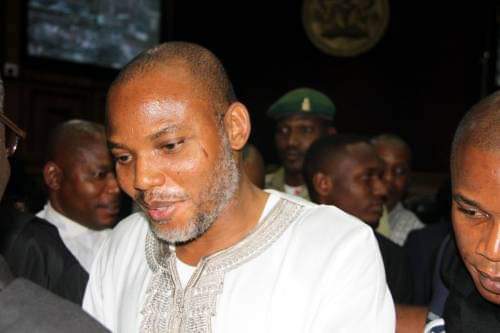Nigerian Government To Release IPOB Leader, Nnamdi Kanu
The legal team representing Nnamdi Kanu, the detained leader of the Indigenous People of Biafra (IPOB), has submitted a comprehensive list of judgments to the Attorney-General and minister of justice, Lateef Fagbemi, at the Federal Ministry of Justice in Abuja.
The team urged the Attorney-General of the federation to comply with court orders requiring the release of their client.
Barrister Nnaemeka Ejiofor, the head of Kanu’s legal team, addressed journalists on Thursday, stating that the judgements encompassed both domestic and international rulings, all mandating the release of the IPOB leader.
According to Ejiofor, the decision to forward all the pronouncements was made in response to the Attorney General of the Federation’s statement that he was unaware of Kanu’s case and his potential fate.
The team leader urged President Bola Tinubu to release Kanu and honor the multiple court rulings that call for the IPOB leader’s release.
Ibom Focus earlier reported that Kanu filed the notice of preliminary objection on the strength of Sections 1(3); 6(6); 12; 36(2): 36(8): 42; 45 and 251(1)(q) of the Constitution of the Federal Republic of Nigeria, 1999 (as amended), told the court that it has no jurisdiction to try him, stressing that charges filed against him before the court by the Nigerian government are unconstitutional.
The preliminary objection to the court’s jurisdiction was sequel to the ruling by Justice Binta Nyako of the Federal High Court in Abuja on Monday afternoon where she dismissed Kanu’s fresh application seeking the restoration of his revoked bail and his removal from the DSS custody to a house arrest or prison custody.
Ibom Focus had reported that the judge who dismissed the application for lacking in merit, said that Kanu had brought the same application before the court.
Despite the Supreme Court’s ruling in 2023 that Kanu did not jump bail, Justice Nyako said that she found, as a fact, that the IPOB leader jumped the bail granted to him earlier, and that he escaped out of Nigeria.
Justice Nyako further ruled that the sureties who stood for Kanu in the earlier bail, had applied to be discharged, and had been discharged on the ground that they could not locate Kanu and did not know his whereabouts.
The judge held that the only option left for Kanu was to go to the Court of Appeal and should proceed to the appellate court to exercise his right of appeal.
Justice Nyako disagreed with Kanu’s lead counsel, that the Supreme Court held that the earlier bail granted him, ought not to have been revoked, saying that she had perused the Supreme Court judgment copy, and did not see the claim by Kanu’s lawyer.
Reacting to the judge’s ruling, Kanu blasted the Nigerian government for violating the provisions of Terrorism Prevention and Prohibition Act by seeking to try him, saying that Nigerian courts seeking to try him is an act of terrorism.
In the preliminary objection notice, the IPOB leader’s legal team further asked the court to take notice that at the hearing of the preliminary objection, the Defendant shall, in addition to the affidavit, exhibits and the Written Address filed before it, rely on the following grounds:
“Regarding counts 1,2,3,4,5 and 8, the provisions of the Terrorism Prevention Act 2011 (as amended in 2013) under which the IPOB was proscribed and declared a terrorist group are inconsistent with the provisions of the Nigerian Constitution, and are thus void to the extent of the inconsistency.
“Regarding counts 1,2,3,4,5 and 8, there is a subsisting judgment of a High Court to the effect that the executive action leading to the declaration of IPOB as a terrorist group and its proscription is unconstitutional.
“Regarding counts 1,2,3,4,5 and 8, there are two international tribunal decisions against the arrest, detention, prosecution and trial of the Applicant which are, by virtue of the provisions of the Nigerian Constitution, binding on the Complainant and this Honorable Court.
“Count 3 of the charges against the defendant/applicant is unconstitutional as it seeks to punish the applicant for an act that was not a crime when it occurred and is otherwise an abuse of process.
“The Law under which Applicant is being tried in Counts 1,2,3,4,5 and 8 has been repealed.
“Counts 1,2,3,4,5 and 8 are incurably defective as the Applicant is misled by the failure to state the place or where the alleged offenses were committed and the specific dates of the alleged broadcasts.
“Count 15 is not in compliance with the Administration of Criminal Justice Act; it is not within the territorial jurisdiction of this Honorable Court; and it is not supported by any proof of evidence; and Law under which Applicant is being tried in these Counts has otherwise been repealed.”
The notice noted that “This Honorable Court has the constitutional vires and the inherent jurisdiction to interpret the Constitution and the laws of the Federation of Nigeria.”


